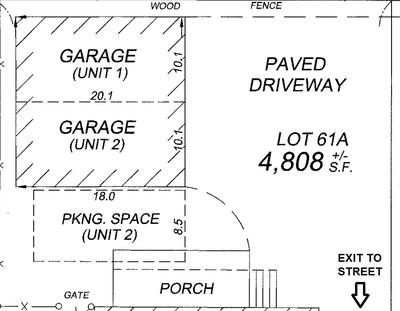Unenforceable Parking Restriction
by Frank
(Arlington, MA)

Parking and Driveway Configuration
Visitor Question: My condominium association is a two unit association within a two-family home. I am the Declarant who created the association and still owns one of the units. I have the right to make amendments to the Master Deed correcting errors of a technical nature.
The Master Deed assigned three exclusive use parking spaces (two for Unit 2, one for Unit 1) within the common areas. The driveway area can also accommodate at least one additional vehicle in a manner that does not interfere with Unit 2's access to its two assigned parking spaces and this was the pattern of usage for years since the association was created. Recently, however, the Unit 2 owner has pointed to a restriction within the Master Deed which prohibits all parking within the driveway area (which does not include the exclusive use parking space areas as shown in the attached diagram). I want to understand whether or not the restriction is enforceable based on the reasons I outline below.
The town zoning laws require that this particular property allow parking for four vehicles (two per unit). Additionally, the section of the Master Deed containing restrictions asserts that the restrictions "shall be enforceable insofar as permitted by law". I claim that this renders the restriction prohibiting driveway parking unenforceable as it does not allow compliance with the zoning law requirement of four parking spaces. I informed the other owner that the restriction is an error that must be either removed or relaxed to allow compliance with zoning laws; the other owner maintains that the restriction is a binding contract. Whether or not he understood that the section on restrictions explicitly defers to the law, the other owner next argues that to allow parking for a fourth vehicle now would reduce his ability to maneuver freely within the driveway and that this ability is what he bought into when he purchased his unit.
This is what I would like to determine:
a) Given what I have described, is the parking restriction unenforceable as it does not allow compliance with town zoning laws and the Master Deed itself states that restrictions must be lawful?
b) Is there any validity to the other owner's latest argument regarding maneuverability? His access to his parking spaces is not impaired or impeded unreasonably. He would have to look when he is backing out of his garage space if another car was parked in the driveway in front of Unit 1's garage space but that is not unreasonable (see attached diagram). Also, there are no minimum maneuverability requirements within the town zoning laws. Can convenience supersede law?
c) If I am correct in my assertions, is the matter of correcting the restriction something that can be considered a technical error so that I can amend the Master Deed using my rights as Declarant? The other owner will not cooperate even if he knows I am right and I would like to avoid having to get a judge to rule on the matter.
Editors' Reply: Thank you for posing such an interesting question. However, for this question, we will have to emphasize that we are not attorneys, but rather planners.
So our answer to your questions (a) and (c) is that you should consult an attorney licensed to practice in your state. Ideally if the attorney who drew up the restrictions originally is still in practice in your area, consult the same person or firm.
We say you must find an attorney because even if you are allowed to make a change because the original makes a technical error, you are going to need an attorney to determine that and to draft the change.
We do think that the requirement of the zoning ordinance for four parking spaces is germane to the resolution of this situation, but it's hard for us to predict whether this would be considered a technical error or not.
Our planner-level opinion is that since the two parts of the restrictions appear to contradict one another, yes, this could be considered a technical error. But local practice and case law in your state could make our reasoning very impractical.
We feel confident of our planner-type answer for your question (b), however. Maneuvering difficulty or any other type of inconvenience doesn't make a deed restriction invalid. That argument just seems silly to us.
Readers, this situation points up the difficulties and dangers of having a two-residence condo association, especially when the Declarant still lives in a unit. In these situations it is very important to make sure that the attorney drawing up the restrictions is extremely diligent to make sure the rules are crystal clear and even that a dispute resolution mechanism is set forth.
Making and Keeping a Good Community > - Questions >
- HOA and Deed Restriction Questions > Unenforceable Parking Restriction
Join GOOD COMMUNITY PLUS, which provides you monthly with short features or tips about timely topics for neighborhoods, towns and cities, community organizations, and rural or small town environments. Unsubscribe any time. Give it a try.